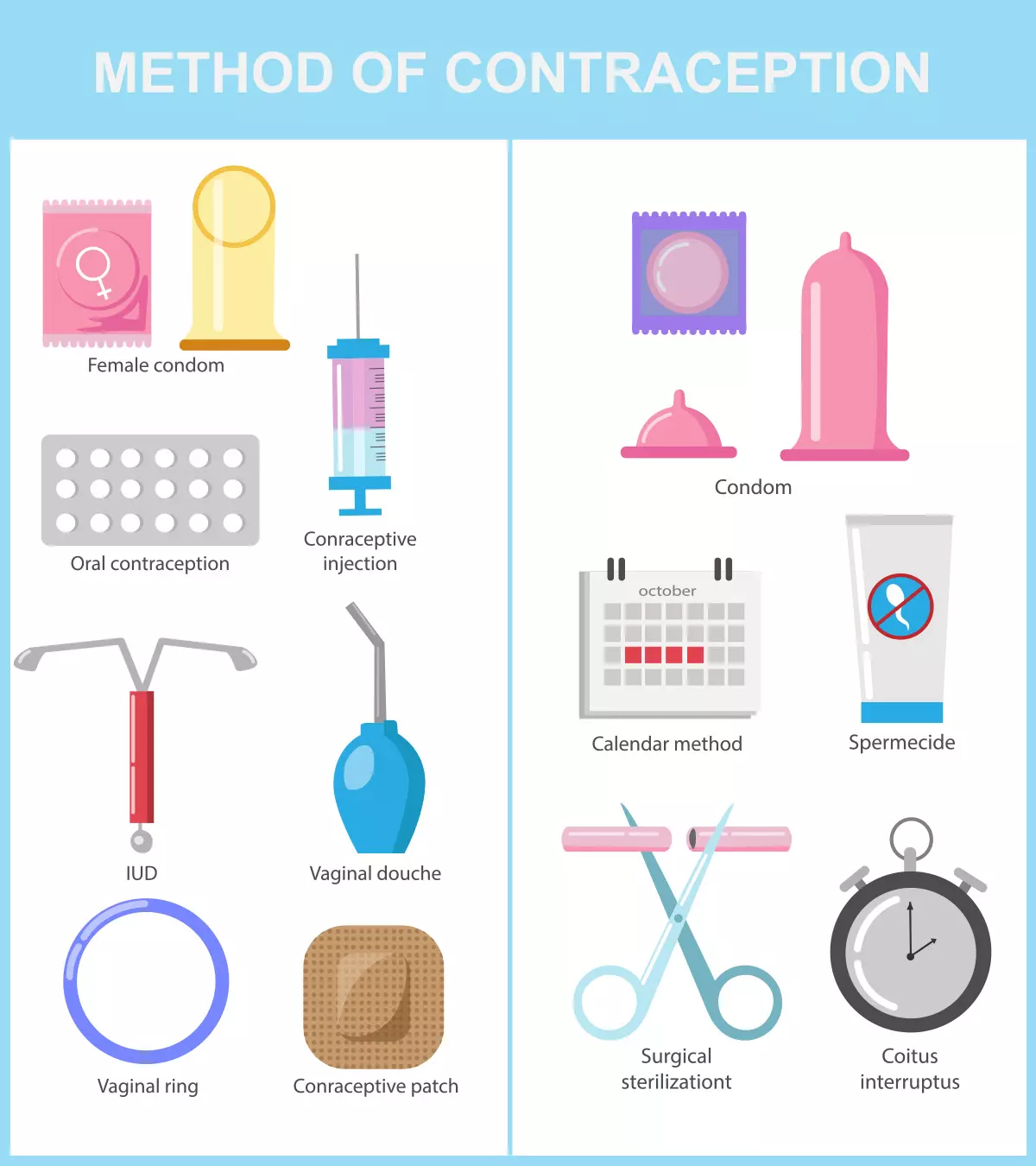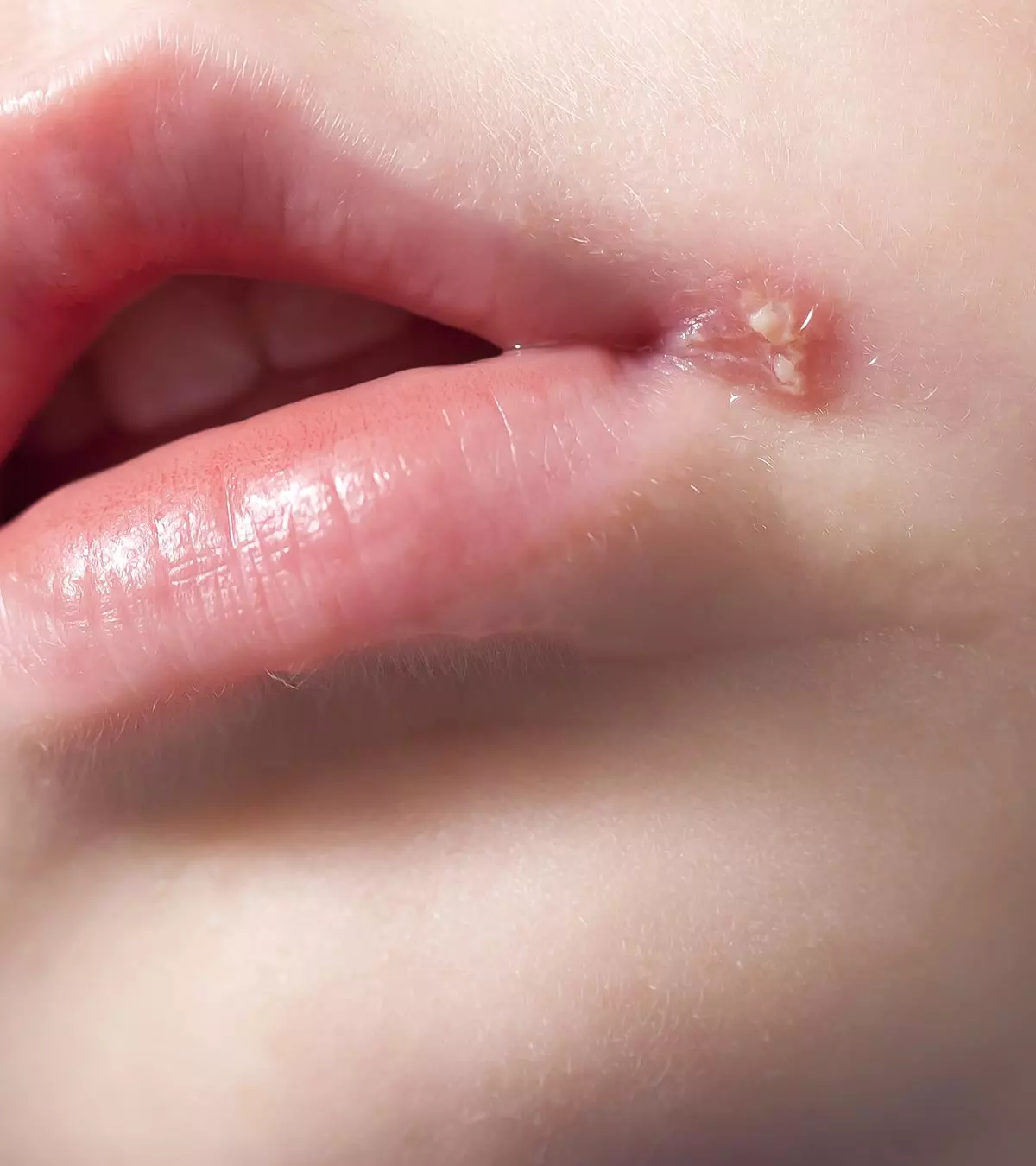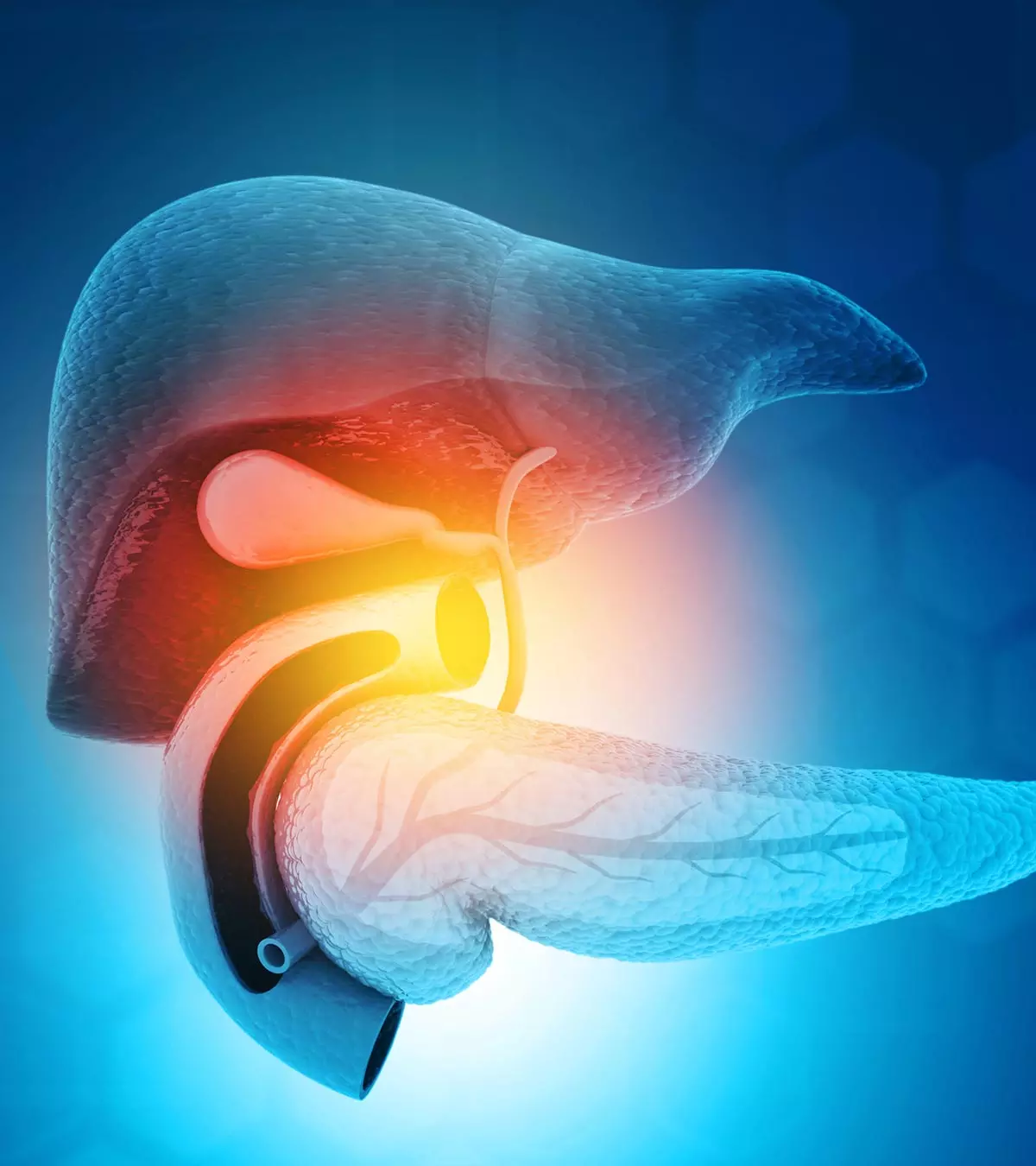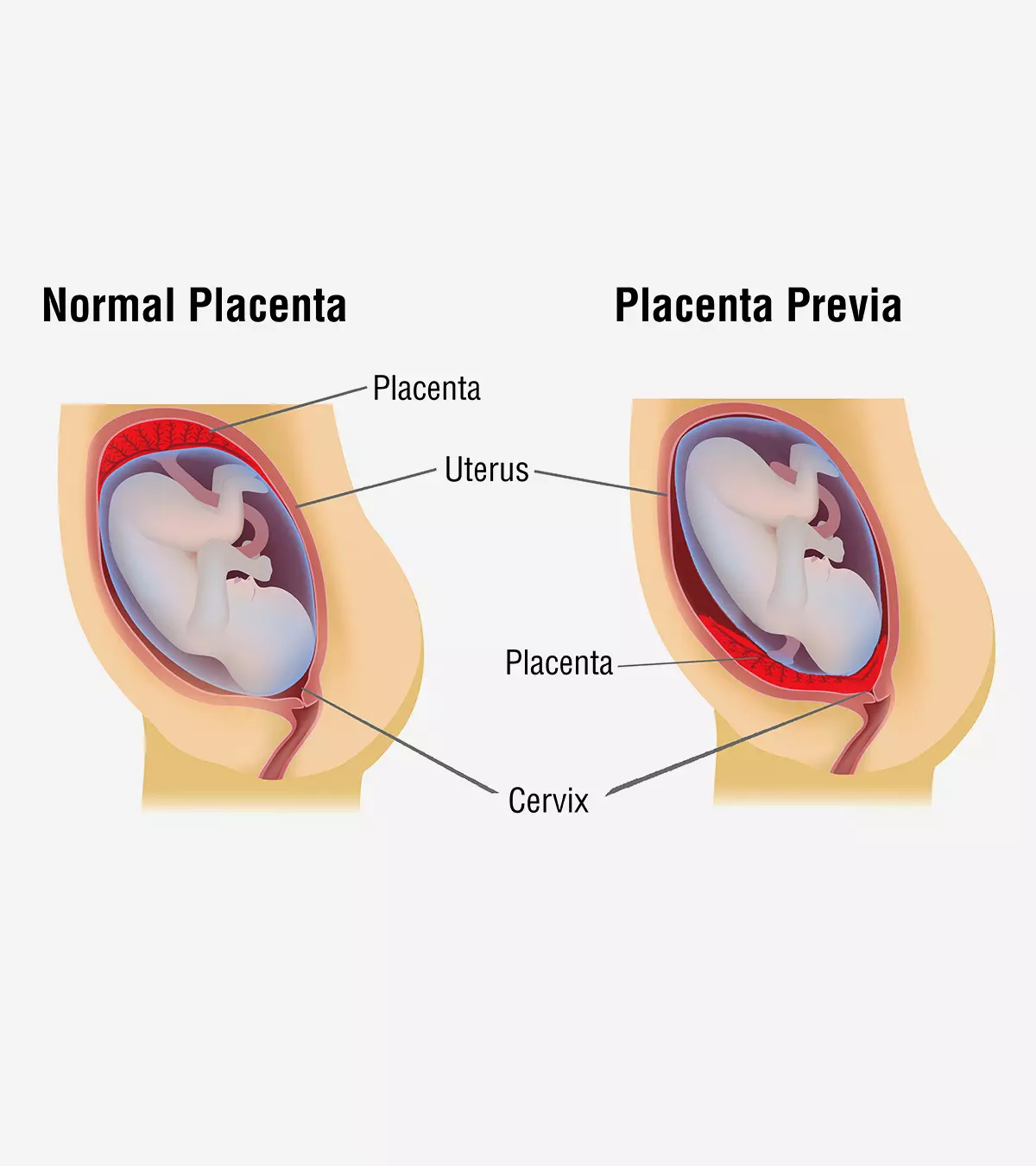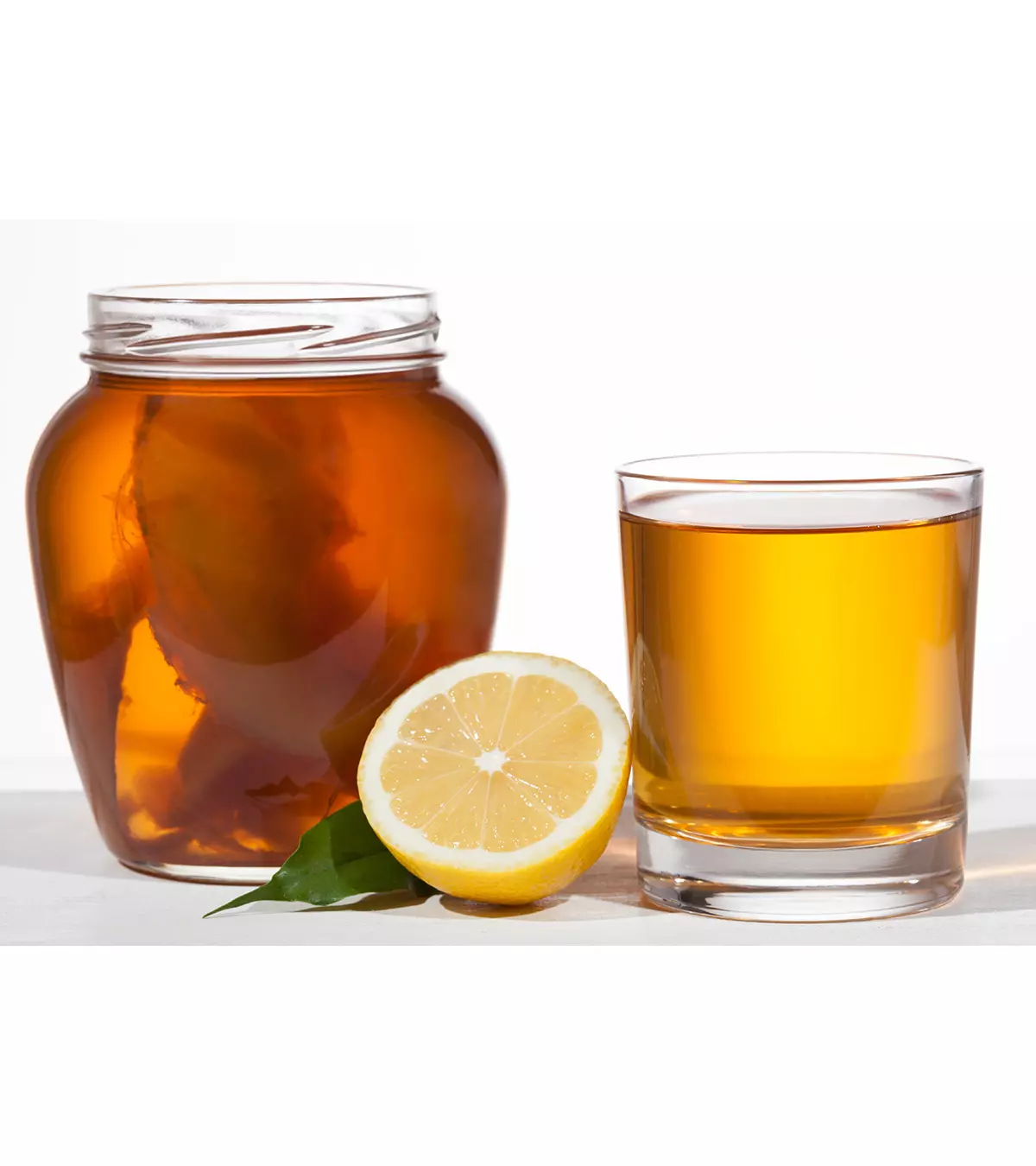
Image: Shutterstock
The native drink of China, Kombucha, imparts many health benefits. But can kids drink kombucha? Children’s bodies work differently than adults. Hence, parents need to exercise caution while introducing children to any new food or drink item. Kombucha, or the immortal health elixir, is a slightly sour, fizzy beverage, more particularly a fermented tea prepared with a mixture of black or green tea, sugar, and a symbiotic culture of bacteria and yeast (SCBY) which converts the sucrose to ethanol through carbonation.

Fruit juices may also be used in its preparation. The fermentation is a week-long process and leads to 0.5% alcohol content. Given the lack of infallible evidence of its 100% safety, there can be certain side effects such as allergies and stomach infections. That is why a doctor’s consultation is important. Read on to know more about kombucha for kids, including its side effects and some safety tips.
Key Pointers
- Kombucha is a fermented drink made of tea, sugar, and a combination of bacteria and yeast.
- The fermentation process lasts for a week and results in an alcohol content of 0.5%.
- Kombucha offers several health benefits, including improved digestion, immunity, and cellular health.
- It can also prevent depression, detoxify the body, boost energy, and decrease sugar cravings.
- Excessive kombucha consumption may cause side effects such as allergies, gastric problems, and infections.
- It is important to consult a doctor before giving kombucha to children.
12 Health Benefits Of Kombucha For Kids
1. Improves digestion
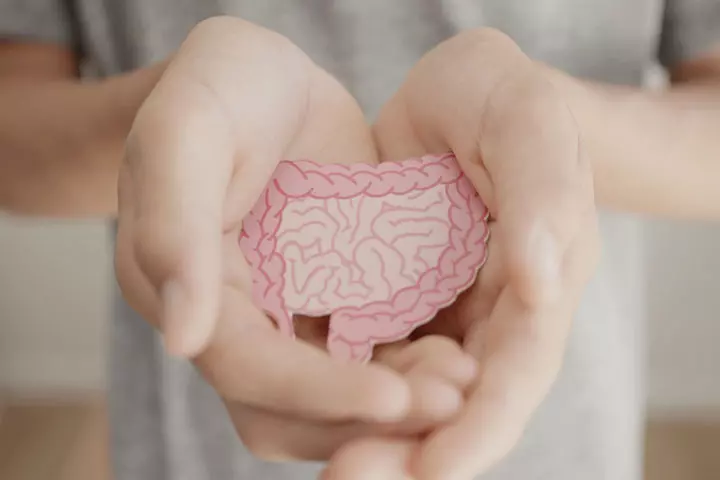
Naturally fermented probiotics in the Kombucha promote the growth of beneficial microorganisms and aid in maintaining healthy gut flora of children thereby preventing acidity. Probiotics for kids can play a crucial role in supporting their digestive health and strengthening their immune system. The fermented tea contains about 20 strains of yeast which are beneficial for the gut. The consumption of kombucha helps break nutrients down into easily digestible elements and improves the absorption of minerals, such as iron, magnesium, copper, phosphorus, calcium, and zinc. These minerals help in boosting digestion.
2. Prevents depression
By including kombucha in your kid’s diet, you can help improve your child’s mental clarity, stabilize his moods, and fight depression and anxiety problems. Kombucha comprises vitamin B1 (thiamine), vitamin B6, and vitamin B12, which helps your kid combat depression and improve his concentration abilities significantly.
3. Detoxifies the body
Being a natural detoxifier, Kombucha promotes detoxification. The fermented tea is rich in several enzymes and bacterial acids and minimizes load on pancreas and liver. Also, glucuronic acid content in kombucha binds to the toxins present in the body and promotes their smooth excretion through intestines or kidneys.
4. Prevents risk of cancer
Glucaric acid content in kombucha aids in preventing the potential risk of cancer in children to a great extent. Medical studies reveal that kombucha cures cancer without any radiation or chemotherapy.
5. Promotes cellular health and immunity
Kombucha is a rich source of powerful antioxidants and organic acids, such as glucuronic acid, that promote cellular health. Antioxidants protect your kid’s body from potential oxidative damage by neutralizing free radicals, repairing the damaged cells, and preventing inflammations and ailments. Also, high antioxidant content boosts your kid’s immunity substantially (1).
6. Treats gastric ulcers
If your child suffers from gastric ulcers, drinking kombucha can offer him great relief. Antioxidants and phenols in the fermented tea aid in safeguarding the mucin content (which could lead to cancer) present in the gastric tissues, reduce the formation of the excess of gastric acids, and cure gastric ulcers quickly (2).
7. Keeps the nervous system healthy
Kombucha promotes the smooth functioning of your child’s nervous system. The fermented tea is rich in vitamin C, vitamin B9 and B vitamins, amino acids, methylxanthineiNatural and synthetic compounds found in common beverages and foods used as ingredients in some medicines , and alkaloidsiNatural compounds found in plants and some fungi; also known for their pharmacological effects , hence working well against epilepsy, nervous disorders, stroke, and headache in kids effectively.
8. Increases energy and decreases sugar cravings
Kombucha promotes hydration and is a natural energy booster. It also helps in regulating your child’s sugar cravings, which help in controlling weight. It helps in curbing soft drink cravings too.
9. Improves eyesight

Kombucha contains nutrients that help enhance your kid’s eyesight significantly. The tea helps in the removal of floaters (which are spots in vision).
10. Helps treat anemia
Organic acids in the kombucha convert plant’s iron compounds into divalent iron ions, thus making iron from the plant sources available to humans. Also, Kombucha is rich in vitamin C, which aids in iron absorption substantially. Drinking the fermented tea on a regular basis will help boost hemoglobin count and treat the symptoms of anemiaiA condition characterized by reduced levels of red blood cells and hemoglobin in a child’s body , such as fatigue and dizziness.
11. Prevents joint problems
Glucosamine content in kombucha prevents and treats joints related problems and joint damage in kids significantly. Glucosamine increases the production of synovial hyaluronic acid, which supports the preservation of cartilage and joint collagen, and prevents pain.
12. Treats microbial infections
The anti-microbial properties of kombucha work against pathogenic bacteria, such as Salmonella and E Coli, and cure infections. The tea is rich in organic and acetic acids, enzymes, proteins, and bacteriocins that provide your child antimicrobial benefits to enjoy good health (3).
Can Kids Drink Kombucha?
Though kombucha is safe for children, you should give it to them only after consulting your physician to avoid its side effects. We list some potential side effects of having excess kombucha.
 Point to consider
Point to consider6 Side-Effects Of Kombucha On Kids
1. Diarrhea and bloating

Kombucha is one of the healthy drinks for kids. However, drinking an inappropriate amount of kombucha can make your child suffer from bloating, gas, and diarrhea. Children respond to different drinks in different ways. Heartburns, ulcers, and other gastrointestinal disorders are also some of the effects. Consult your physician for the required dosage of the tea is always beneficial (4).
2. Lightheadedness
Lightheadedness is one of the common side effects that kids can experience after drinking kombucha. Excess of kombucha can cause dizziness, significant drop in the blood pressure, urination, shortness of breath, throat tightness, liver inflammation, nausea, and vomiting.
3. Changed appetitive behaviors
You prepare kombucha by brewing black tea and sugar, so it contains about 0.5% alcohol. Even though this is a negligible amount, it is wise to exercise caution as having excess kombucha increases alcohol intake which can put your child in danger. Caffeine levels in the fermented tea, if high, can cause fluctuation in sugar levels, anxiety disorders, and discomfort in kids (5).
4. Calcium depletion
Excess consumption can cause calcium depletion in children as it binds itself to body essential minerals. Increasing your kid’s mineral, particularly calcium intake, by increasing his milk intake, can counterbalance the effect.
5. Affects the immune system
Small amounts of wild yeasts or pathogenic bacteria in kombucha can affect your child’s immunity adversely if he has a weak immune system. So, make sure you don’t rely entirely on kombucha to enhance your kid’s health. Ensure your child eats healthy foods daily.
6. May increase the frequency of cold and flu
Kombucha can pose a risk to the newly developing balance and body system of child and make your child hyperactive. It increases the frequency of cold and flu in kids. In addition to this, your kid may become vulnerable to high fevers, skin disorders, and asthma.
 Caution
Caution6 Safety Tips To Follow While Giving Kombucha To Kids
You can avoid the adverse effects by following certain tips. Here, we list some safe ways to give kombucha to your children.
- Choose store-bought kombucha tea over home-brewed concoction as home-made kombucha may be contaminated and prove risky. Check the sugar content on the label and choose a kombucha with less sugar.
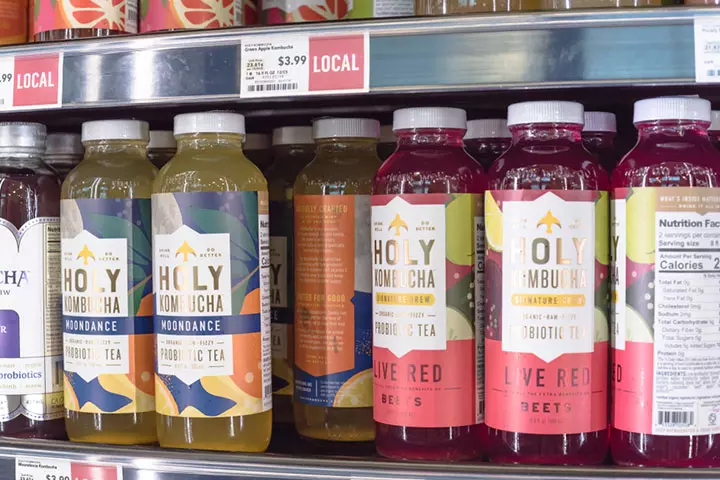
- Initially, begin to give one tablespoon of the fermented tea and then increase the intake if your kid suffers from no adverse reaction.
- Store the kombucha by following the instructions on the purchased bottle from the stores.
- You can dilute kombucha to reduce its strength if you think it would be too strong for your child.
- Kombucha in sparing quantities counterbalances dehydration.
- Provide your child a balanced diet full of nutrition every day.
 Be watchful
Be watchful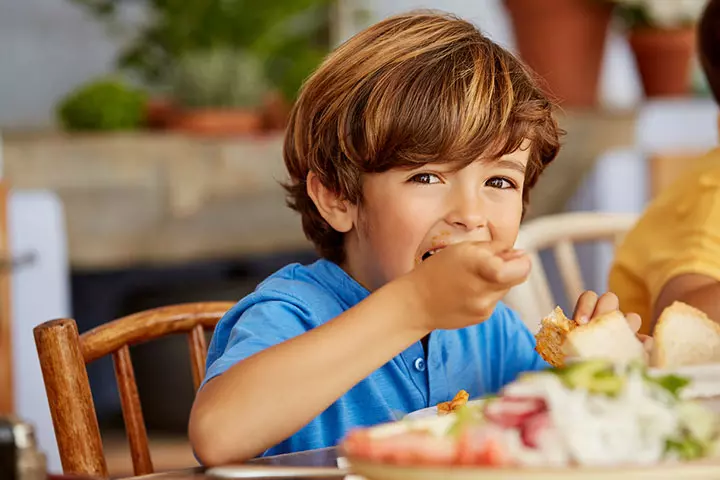
Flavored Kombucha Recipes
1. Pineapple infused Kombucha

You will need:
- 300ml Kombucha
- 50g pineapple (cut into small pieces)
- 2 tbsp pineapple juice concentrate
- ½ tbsp coconut extract
How to:
- Take a mason jar and Kombucha to it.
- Add pineapple pieces, juice concentrate, and coconut extract to the same jar and close the lid
- Shake the jar and let sit for 24 hours
- Serve once the flavors have infused
2. Strawberry-vanilla Kombucha
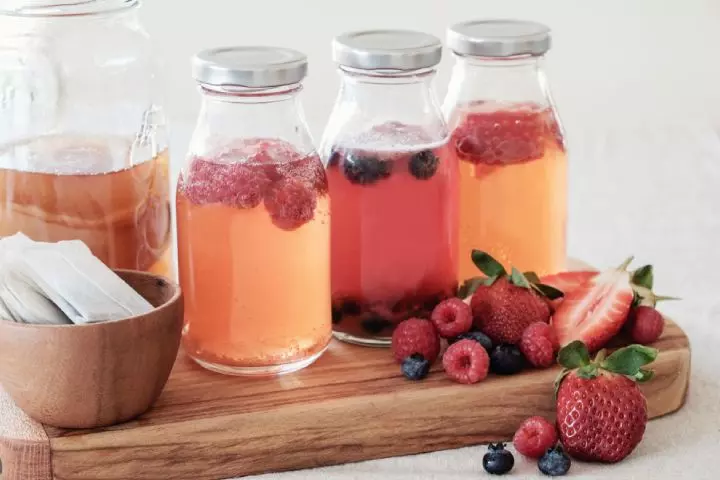
You will need:
- 350ml Kombucha
- 8 strawberries (cut into pieces)
- ½ tsp oil-free vanilla extract
How to:
- Take a mason jar and Kombucha to it.
- Blend strawberries to a smooth puree.
- Add strawberry puree and vanilla extract to the Kombucha jar
- Shake the jar and let sit for 24 hours for flavors to infuse.
- Try the same recipe with other berries for a blast of flavors
 Caution
CautionFrequently Asked Questions
1. Can kids legally drink kombucha?
Kombucha has less than 0.5% of alcohol content. In some states of the US, it is legal for children to drink beverages that have less than 0.5% alcohol. Hence, according to your state’s guidelines, you may check if your child can consume kombucha (5).
2. Is all kombucha alcoholic?
Kombucha is a fermented drink. The fermentation process naturally releases alcohol as a by-product. A few brewers might try to reduce the alcohol content of the drink. But a negligible amount of alcohol does remain in the drink.
3. How much caffeine is in kombucha?
Kombucha usually has around 10-25 milligrams of caffeine per serving once brewed (9).
4. Can Kombucha be harmful to children with certain health conditions?
Yes, kombucha can pose risks to children with specific health conditions, such as liver or kidney disease, HIV, compromised immune systems, and alcohol addiction. However, for others, when prepared safely and consumed in moderation, kombucha can serve as a revitalizing drink with numerous advantages (10).
5. Can Kombucha have an impact on children’s teeth or cause dental issues?
Yes, kombucha can affect children’s teeth and cause dental problems. The acid in kombucha can erode tooth enamel, providing a breeding ground for harmful bacteria. Consequently, this can lead to plaque buildup, gum disease, and tooth decay (11).
6. What are the potential risks of children drinking unpasteurized Kombucha?
Potential risks of children consuming unpasteurized kombucha include the presence of harmful bacteria and molds that can contaminate the drink during processing. Drinking contaminated kombucha can cause dizziness, nausea, vomiting, headaches, and other health problems (12).
7. Can Kombucha interact with any medications that children may be taking?
Yes, kombucha can interact with medications that children may be taking. It is advisable to refrain from giving kombucha to children at risk of metabolic acidosis or immunocompromised (13).
8. What is the recommended age for introducing kombucha to children?
The consensus is that children under one year should not consume kombucha due to potential risks of bacterial contamination and alcohol content. For children aged one to four years, limited consumption of up to ½ cup per day is advisable.
Kombucha is a fermented drink that’s usually available in the sweetened form. Children can occasionally consume store-bought, pasteurized kombucha. However, you should not feed homemade kombucha to children as it has higher alcohol content. Besides, homemade kombucha has the risk of bacterial contamination that could have adverse health effects. So, pick a commercial kombucha that has lower sugar content. Doing so will help prevent excess sugar consumption that may lead to issues such as obesity and cavities.
Infographic: Ways To Introduce Kombucha To Children
Fermented drinks like kombucha are a great alternative to commercially prepared sugar-filled beverages. But only a few children may like the taste or flavor of these drinks. Still, there are methods to make them try these savory drinks. The infographic below outlines ways to familiarize your child with kombucha and similar fermented drinks.
Some thing wrong with infographic shortcode. please verify shortcode syntaxDiscover the amazing health benefits of drinking kombucha! A nutrition expert reveals all in this must-see video!
Illustration: Can Kids Drink Kombucha? - Read To Know!
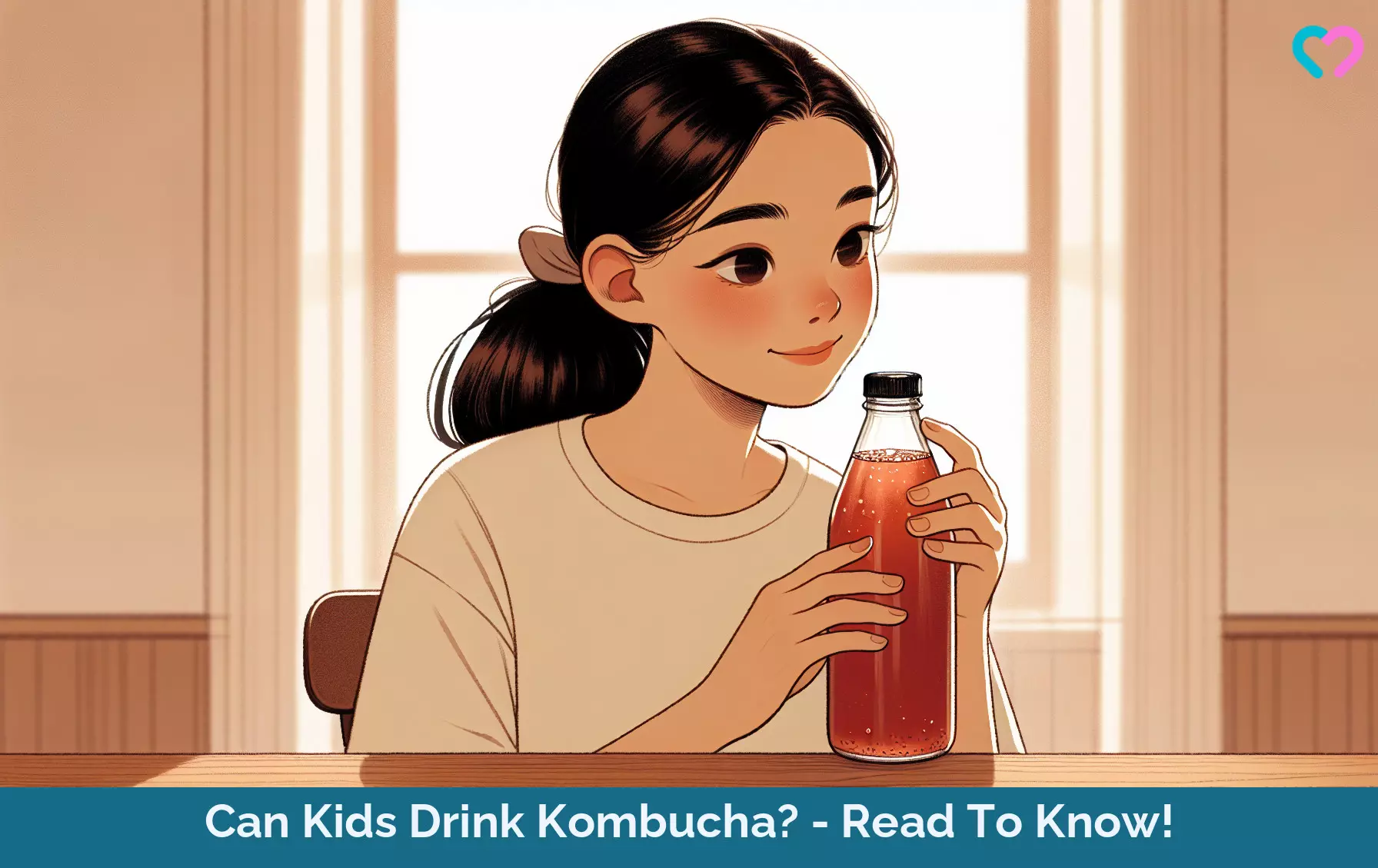
Image: Dall·E/MomJunction Design Team
References
- Kombucha.
https://fsi.colostate.edu/kombucha/ - Debashish Banerjee; (2010); Comparative healing property of kombucha tea and black tea against indomethacin-induced gastric ulceration in mice: possible mechanism of action.
https://pubmed.ncbi.nlm.nih.gov/21776478/ - Ilmāra Vīna et al.; (2014); Current evidence on physiological activity and expected health effects of kombucha fermented beverage.
https://pubmed.ncbi.nlm.nih.gov/24192111/ - Radhika Srinivasan et al.; (1997); Probable Gastrointestinal Toxicity of Kombucha Tea.
https://www.ncbi.nlm.nih.gov/pmc/articles/PMC1497178/pdf/jgi_7127.pdf - A M Hartmann et al.; (2000); Effects of chronic kombucha ingestion on open-field behaviors longevity appetitive behaviors and organs in c57-bl/6 mice: a pilot study.
https://pubmed.ncbi.nlm.nih.gov/10978857/ - Alcohol Beverage FAQ
https://www.commerce.alaska.gov/web/amco/AlcoholicBeverageFAQs.aspx - Can probiotics help when my child has an infection and needs to take antibiotics?
https://www.healthychildren.org/English/tips-tools/ask-the-pediatrician/Pages/Can-probiotics-help-prevent-tummy-trouble.aspx - What Are Kombucha’s Health Benefits (and How Much Can You Safely Drink)? Cleveland Clinic
https://health.clevelandclinic.org/what-are-kombuchas-health-benefits-and-how-much-can-you-safely-drink - Does Drinking Kombucha Have a Bucha Health Benefits?
https://sclhealth.org/blog/2019/10/does-drinking-kombucha-have-a-bucha-health-benefits/ - The Do’s and Don’ts of Kombucha.
https://www.chhs.colostate.edu/krnc/monthly-blog/the-dos-and-donts-of-kombucha/ - Kombucha: Cancer Cure or Caries Contributor?
https://www.acsh.org/news/2025/09/17/kombucha-cancer-cure-or-caries-contributor-15815 - Assessment of Kombucha Tea Recipe and Food Safety Plan
http://www.bccdc.ca/resource-gallery/Documents/Educational%20Materials/EH/FPS/Food/kombucha1.pdf - Kombucha.
https://www.publish.csiro.au/hc/Fulltext/HC15930
Community Experiences
Join the conversation and become a part of our nurturing community! Share your stories, experiences, and insights to connect with fellow parents.
Read full bio of Reda Elmardi
Read full bio of Manjiri Kochrekar
Read full bio of Swati Patwal
Read full bio of Shinta Liz Sunny









